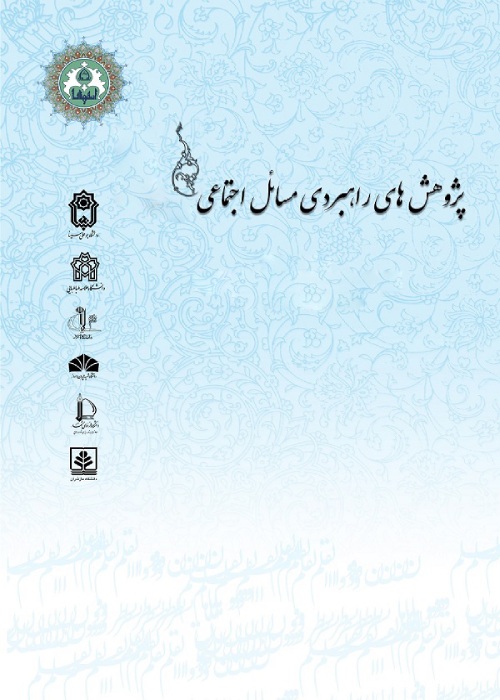Production and Reproduction Processes of Deprivation of Education in Sistan and Baluchestan
Deprivation of education is a serious problem in developing countries and many children of school age are out of school every year. Out-of-school children may have never attended school or may have decided to drop out for any reasons a while after attending school. Despite the many efforts made to reduce the illiteracy rate in Iran, especially after the Islamic revolution, the statistics in recent years indicate a growth in the number of children missing out on education. To eliminate this lack of education, it is very important to identify the factors that cause it. The previous research has identified a wide range of factors. Since Iran is a vast country with climatic, cultural, and social diversities, it is necessary to identify the effective factors in different regions separately. Sistan and Baluchistan is the largest province of the country, which has had the highest rate of education dropout for many years. The special condition of this province in connection with the general condition of the country has made it in need of a special explanation. This study tried to provide an understanding of the structural process of the deprivation of education in Sistan and Baluchestan.
The present research investigated the dropout from education in Sistan and Baluchistan Province by using a qualitative method and a semi-structured interview technique. The participants in this research were 40 people involved in the issue of dropping out education and and their families, as well as those who were familiar with it, including a set of administrators, teachers, and civil activists in the field of education, and other educational professionals. The interviews with their different spectrums took place in different regions of this province, such as Zabul, Zahedan, Chabahar, Iranshahr, and Sarbaz. 5 managers of education, 15 teachers, 10 NGO activists, 5 parents, and 10 surviving children in the age range of 10-15 years formed a network of 40 interviews. The questions were structured around these axes: economic conditions, reasons for survival, and cultural and geographical issues. Since the interviews were conducted in a semi-open manner, the proposed axes and platforms in this process gave an exploratory characteristic to the present study. By focusing on the theme analysis model, we tried to extract the main concepts and themes and explain them in a conceptual format. For this purpose, the key concepts were extracted for each interview by examining the contents and themes of the interviews. Meanwhile, instead of focusing quantitatively on the interviews and counting the themes, we focused on the points emphasized by the interviewees.
Discussion of Results & Conclusions :
Although dropout from education in Sistan and Baluchistan Province was influenced by the same factors that could be discussed in other parts of Iran, an attempt was made to gain a phenomenological understanding of the phenomenon of dropout from education in the province in this short essay. The causes of educational attrition could be divided into several categories. At the macro-structural levels, we could talk about the geographical areas and deep-rooted poverty, which made the structural background of many crises. At intermediate levels and in the form of cultural processes, we could talk about sectarianism, tribalism, and patriarchal culture. At micro levels, family size and negative attitudes towards official actions were identified. These of macro, mid-range, and micro levels reinforced each other in the cycles they created, one of the outputs of which was dropout from education.The problem of not being educated should be understood in the logic of reproduction. Reproduction is a process, during which the actors’ patterns of action lead to the strengthening and stabilization of the existing structure. In more precise terms, the process of reproduction means creating a cycle that stabilizes and repeats macro-economic and political, structures, etc. through the mediation of educational and cultural processes. Thus, although lack of education occurs at an individual level, it is meaningful within a cycle that links the factors of macro-structural level (rooted poverty, geographical situation, and center-periphery logic) to cultural processes (patriarchy, influence of the traditionalists’ local powers, tribalism, and sectarianism), which are linked and intersected at the micro levels with a traumatic family structure and negative attitudes towards official actions and education, ending up in educational failure. Being out of school again as an individual disability deprives a person, who has a set of opportunities, from education and throws him/her into poverty and inequality, which lead to the lack of facilities and development opportunities, while this cycle repeats itself continuously.On the one hand, we should focus on the individual factors of school dropout and on the other hand understand the processes of school dropout. Common analyses can prepare a list of factors affecting dropout from education, while understanding the relationship between these factors, the way of formation of the dropout structure, and the cycle of its repetition is much more important.
- حق عضویت دریافتی صرف حمایت از نشریات عضو و نگهداری، تکمیل و توسعه مگیران میشود.
- پرداخت حق اشتراک و دانلود مقالات اجازه بازنشر آن در سایر رسانههای چاپی و دیجیتال را به کاربر نمیدهد.



